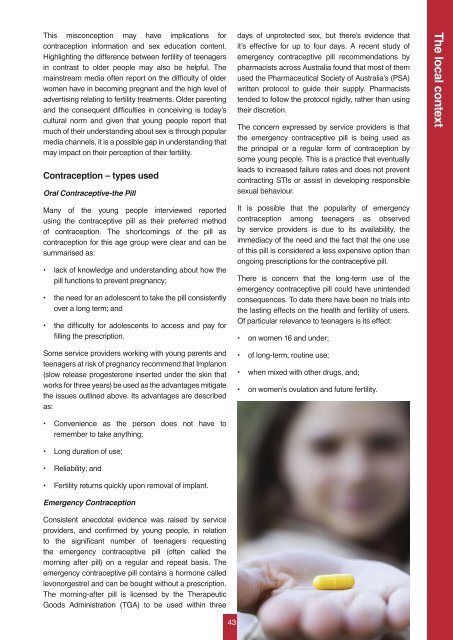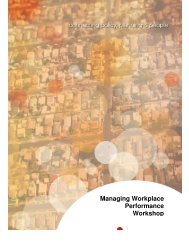Teenage Pregnancy Research Report - 3p Consulting
Teenage Pregnancy Research Report - 3p Consulting
Teenage Pregnancy Research Report - 3p Consulting
You also want an ePaper? Increase the reach of your titles
YUMPU automatically turns print PDFs into web optimized ePapers that Google loves.
This misconception may have implications forcontraception information and sex education content.Highlighting the difference between fertility of teenagersin contrast to older people may also be helpful. Themainstream media often report on the difficulty of olderwomen have in becoming pregnant and the high level ofadvertising relating to fertility treatments. Older parentingand the consequent difficulties in conceiving is today’scultural norm and given that young people report thatmuch of their understanding about sex is through popularmedia channels, it is a possible gap in understanding thatmay impact on their perception of their fertility.Contraception – types usedOral Contraceptive-the Pilldays of unprotected sex, but there’s evidence thatit’s effective for up to four days. A recent study ofemergency contraceptive pill recommendations bypharmacists across Australia found that most of themused the Pharmaceutical Society of Australia’s (PSA)written protocol to guide their supply. Pharmaciststended to follow the protocol rigidly, rather than usingtheir discretion.The concern expressed by service providers is thatthe emergency contraceptive pill is being used asthe principal or a regular form of contraception bysome young people. This is a practice that eventuallyleads to increased failure rates and does not preventcontracting STIs or assist in developing responsiblesexual behaviour.The local contextMany of the young people interviewed reportedusing the contraceptive pill as their preferred methodof contraception. The shortcomings of the pill ascontraception for this age group were clear and can besummarised as:• lack of knowledge and understanding about how thepill functions to prevent pregnancy;• the need for an adolescent to take the pill consistentlyover a long term; and• the difficulty for adolescents to access and pay forfilling the prescription.Some service providers working with young parents andteenagers at risk of pregnancy recommend that Implanon(slow release progesterone inserted under the skin thatworks for three years) be used as the advantages mitigatethe issues outlined above. Its advantages are describedas:• Convenience as the person does not have toremember to take anything;• Long duration of use;• Reliability; and• Fertility returns quickly upon removal of implant.Emergency ContraceptionConsistent anecdotal evidence was raised by serviceproviders, and confirmed by young people, in relationto the significant number of teenagers requestingthe emergency contraceptive pill (often called themorning after pill) on a regular and repeat basis. Theemergency contraceptive pill contains a hormone calledlevonorgestrel and can be bought without a prescription.The morning-after pill is licensed by the TherapeuticGoods Administration (TGA) to be used within threeIt is possible that the popularity of emergencycontraception among teenagers as observedby service providers is due to its availability, theimmediacy of the need and the fact that the one useof this pill is considered a less expensive option thanongoing prescriptions for the contraceptive pill.There is concern that the long-term use of theemergency contraceptive pill could have unintendedconsequences. To date there have been no trials intothe lasting effects on the health and fertility of users.Of particular relevance to teenagers is its effect:• on women 16 and under;• of long-term, routine use;• when mixed with other drugs, and;• on women’s ovulation and future fertility.43



